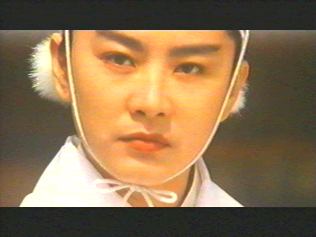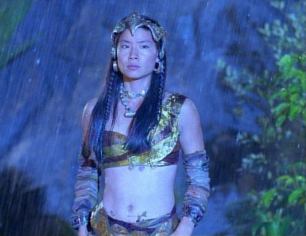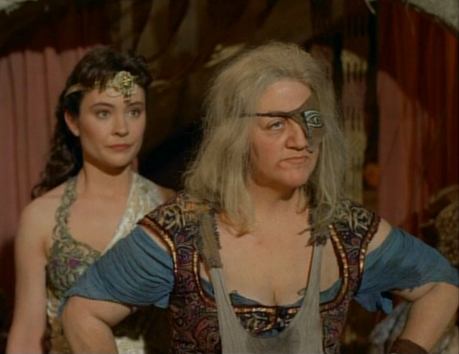We've established that The Bacchae plays an influential role in the concept of both shows, and that the Dionysiac nature of The Stranger who comes to town is spliced up and used here and there as part of the general concept of the wandering hero, and ambitious villain. This concept would be a perfect match for an anti-hero like Xena, especially since Dionysus represents female empowerment, and their lost history, as Xena does. Since the root word for Xena in Greek means "guest", "foreigner"01, and "stranger", and since the letter X symbolizes, among other things, crossed swords (an image we'll see in the series finale), "Xena" is an ideal name for a hero with all the themes and moral contradictions she will embody. The original conception of this character was based on Brigette Lin, and she often played sexually ambiguous characters. In one film, The Three Swordsmen, she plays a male samurai, dubbed with a male voice--there's no acknowledgement of the actress's gender at all. At the end of the film, she/he leaves the warrior path, breaking the sacred sword. We'll see references from this film from Xena's first episode all the way to the end.02

Once a samurai, always a samurai!
|
The original conception of Xena seems to be modeled on the samurai, and Weisbrot makes this connection as well in his book's description03. The Japanese connection is inherit in her DNA, and it would be reasonable to assume that one of the alternate names for her that came up in the brainstorming sessions was Japanese. Since Xena, meaning "Stranger" in Greek was one, then we can assume a similar word in Japanese was also a candidate: "Bekka". Americans would encounter this word in the form of Bekka Schools, Japanese foreign studies programs designed to teach students (i.e., outsiders, strangers) about the language and culture of Japan. As Weisbrot tells us, Bekka was an alternate name for Xena's character when a series was being considered04. Though it might too folksy and girlish to an American audience (like "Buffy"?), pronouncing it the same way as the shortened version of "Rebecca", "BEK-uh", instead of the even Japanese pronunciation, "BEH-KAH", we should also consider that its choice may also be influenced by Euripides' play, The Bacchae--some popular versions use the original Greek title for the play, the one-worded "Bakkhai". So, Bekka is a cool-sounding warrior name with the right backstory, but requires some explaining for an American audience, whereas Xena would instinctively sound right. And maybe this is where Rob Tapert stepped in and said that an X name would sound better.
The mystery of the hidden Xena episode is solved when we realize that her original alternate was probably Asian. Looking at the trilogy of "Xena" episodes, we'll notice an episode preceding it: March to Freedom, featuring an Asian warrior woman, "a flower of the mystic East". My guess is that once they decided on Xena, that left them with an Asian-themed story they could split off and use right away, without getting in the way of Xena's story. it wouldn't be forgotten, however: when it came time to end Xena's story, they would return to the source and combine the two, giving us the full concept of Xena at the very end.

The Asian heroine of March to Freedom was played by another famous Lucy: Lucy Liu. She isn't named Bekka, but rather, Oi-Lan. I believe this is a name based on a related concept involving the bacchae, and I'll discuss how it's reused later on, during the fifth season of Xena. Oi-Lan is introduced similarly to Deianeira in Hercules and the Lost Kingdom: she's about to be auctioned off as a slave, to rescue her husband who had been taken prisoner while leading refugees to Calydon, that city of freedom, associated with Dionysus, as we saw earlier in The Road to Calydon. Her husband was betrayed to slave merchants, and he's on his way to Libya. As with Deianeria, Oi-Lan has only one gift to show from her distant, uncaring father: her martial arts education (as she fights, her hair whips around like Brigitte Lin's in The Bride movies). This mirrors Xena's martial education from her symbolic father, Ares. Oi-Lan can take care of herself, so she doesn't need Hercules to rescue her. Like Brigitte Lin, in The Bride With White Hair, she's another betrayed bride seeking vengeance. Hercules offers to help, but it will be difficult winning her trust. Her husband, Cyrus, is no warrior--he was an acrobat in her father's court, and she was exiled by her father--like Xena, she wanders the earth, looking for a home with her soulmate. We'll see many of these elements later, as the show comes full circle when Xena herself goes to Japan. Japan is not really a foreign country in this series; it's Greece in disguise: as Oi-Lan tells Hercules, "We come from far different places, Hercules, and yet we come from the same place." Hercules responds by giving her and Cyrus his own lands, hoping their family will take the place of the one he lost. March to Freedom, like The Road to Calydon, is another road to freedom, and they find it on the lands of that Dionysiac character who represents his brighter gift of freedom to mankind.
There are other unifying elements in this episode that lie outside the scope of this essay, but one minor element that does not is the market saleswoman that provides the episode's comic relief. She haggles over the price of wheat with Hercules, trying to get him to throw his nightly services into the bargain--this invokes a comparison with Queen Omphale's buying Hercules as a sex slave, and humorously echoes Oi-Lan's own sale as a concubine. The saleswoman enjoys her wine and has a bawdy sense of humor. In other words, she comes to us from The Cyclops,, her eyepatch making her a cross between the randy satyr and the tipsy one-eyed, single-minded giant. In his plays, Aristophanes repeatedly mocks Euripides for having a mother who worked as a street grocer (a charge he apparently made up), so this woman just might be a cameo appearance by Euripides' mother!

The three official episodes of the Xena trilogy show us Xena's transformation from seductive warlord to redeemed hero. The pattern of her story will follow the same lines as Hercules'. We first see her as a lone, vulnerable woman under assault by thugs, and fear for her safety until we realize she's only playing the part. She's actually their leader, training them to loot and pillage other defenseless villagers. Like the Stranger in The Bacchae, her appearance is deceptive, and she works through seduction, finding a person's psychological weak point and exploiting it. She lures Iolaus away from Hercules, pitting them against each other. In the second episode, The Gauntlet, written by Robert Bielak, but based on a story from Rob Tapert05, Xena is leading a raid on a village, but is angered when she learns her army has killed women and children as well, something she refuses to do. Her unwillingness to kill a child turns her army against her, and she must obey her own rules by running a gauntlet of abuse to leave it. This rule of Xena's, that she never kills women and children, was adopted by the producers to make her sympathetic as an anti-hero; otherwise, it would be hard to wish for her redemption, while her character is still unknown. But we will learn in the series final that she has killed women and children, and we'll see numerous times when she's either been implicit in their deaths, or attempted to kill them. I believe this is not an evolution of her character, but instead, a revelation of it. Euripides' play, Herakles, provides the model of a hero who seeks and wins redemption after killing his wife and children, and since Hercules did not adopt this aspect on the show, Xena will adopt part of it--that of the bacchic killer seeking atonement--but not this terrible part, for now. That's because we don't know Xena yet, or the dark secret that pursues her like the costumed figure of Death in Black Orpheus. By the time we come to sympathize with her, we'll be able to accept this awful revelation, and understand her final decision.
The Gauntlet also brings back Salmoneus, the satyr/salesman from Spartacus, and he pitches a similar deal to Xena that he did in his first appearance to Hercules, involving her marketability as a hero! Another in-joke perhaps of the difficult sell she would be to a general audience, and it matches how the slave-dealer in Spartacus praised the virtue of his captive as a gladiator for sale. The comparison of Xena with Brigitte Lin is made explicit in the borrowing of the running of the gauntlet from The Bride With White Hair. There, Lin plays a witch who attends the bacchic celebrations of her warrior clan, then leaves her murderous cult for a lover from a rival clan. This gauntlet is another scene that will be mirrored in the finale set in Japan. So Xena's introduction shows us a kind of provisional redemption, that will allow her to atone for it fully, one day.
The final episode's title of the trilogy, Unchained Heart, is a play off of an old Steve Reeves movie, Hercules Unchained (it's also another expression of Dionysiac freedom). The Reeves movie focused on the Queen Omphale story, with Hercules incapacitated by her while two brothers fight for the throne of Thebes (a story from Aeschylus's Seven Against Thebes). In this episode, the dark bacchic villain who wants to rule the world is back, in the form of Ares. There aren't any bull-figures here, though, just a dog that will keep growing as long as it's fed, and Ares wants to keep feeding him until he's large enough to help his lieutenant conquer the world. Xena was Ares' former lieutenant, and he was her mentor. She'll have to use her skills against him if she wants to win the right to pursue her own destiny. She does so by fighting evil with evil.The evil lieutenant is fed to the dog, exploding both. In the series final, we'll see another "dog of war" that grows powerful by consuming its victims, and Xena's redemption will come with the explosion of his belly full of souls. Xena thanks Hercules for the chance he's given her: "You unchained my heart." This might also refer to Hercules freeing Theseus from his bonds in Tartarus: he was chained to the Chair of Forgetfulness, and memory will be an important part of Xena's story as well as freedom.
|


